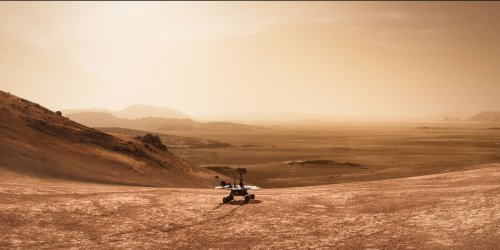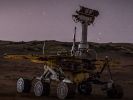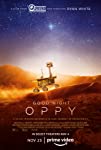Eye For Film >> Movies >> Good Night Oppy (2022) Film Review
Good Night Oppy
Reviewed by: Jennie Kermode

As everybody knows, it takes a lot to work at NASA. Only the best of the best make it – usually people who have worked towards it since early childhood, and have excelled in every aspect of their work. They worked on the Mars rovers, Spirit and Opportunity, for years, knowing that many more would pass before the planets would again come close enough in their orbital paths to give them another shot at it. Years of designing, planning, building, adjusting, and getting to know two robots who inevitably became very dear to them. Then they put them in a rocket and hurled them out into a dangerous void where they would face trial by fire, due to unprecedented solar flares, before searing through the atmosphere of their alien world and dropping to its surface. Because of the time it takes to send signals between the planets, there would be a ten minute period during which nobody on Earth knew whether or not they had made it. In the control room, their creators shared lucky peanuts, because in order to stay sane, there are times when it’s absolutely reasonable to be irrational.
That recognition of the irrational is what lifts Ryan White’s Good Night Oppy far above most science documentaries. It may be about two robots and an awful lot of calculations, but it’s a profoundly human story. It’s hard to imagine that, without such impulses, we would ever have got a spacecraft to the Moon, let alone the red planet. The empathy which humans are capable of feeling for objects is generally treated as a psychological side effect, as sort of misfire or processes needed for practical evolutionary ends, but in this context it absolutely makes sense, having bonded people all across the world and made possible an enduring mission with the potential to contribute to our own survival. It’s a long time before anybody here dares to say it, but what many people feel when thinking of Spirit and Oppy is love.

Oppy, of course, because in the face of such a thing, formalities quickly disappear. With Oppy the feelings are strongest because she survived and kept talking to us for much longer, though as the engineering team points out here, even in the lab on Earth she was the golden child, getting everything right whilst her sister struggled. Spirit had the more difficult mission, but both far surpassed the original three month mission expected of them. This happened because of a wild series of unexpected events which make for a true adventure story, and White tells it with terrific verve.
If you were amused by the use of music in Ridley Scott’s The Martian or Duncan Jones’ Moon, you’ll love the rover team’s use of daily wake-up songs to get their distant colleagues moving. Animated sequenced based on the robots’ real observations show them stretching an gearing up for action on their first day on Mars to the strains of Born To Be Wild, the camera pulling back and the sound quality changing to let us take in the strange bravado of playing Steppenwolf in a vast desert 34 million miles away where music has never been heard before. On Earth, the music plays in the control room, and again it’s a moment of connection as a team still amazed to have made it at all prepares to venture into the unknown.
Although the focus remains on the rovers, we meet members of that team, learning something of their stories. One explains that he spent his childhood wanting to be Geordi La Forge off Star Trek, even though he wasn’t really sure that engineers did. Another says that her father was an engineer but that she didn’t know that was an option for girls. Still another talks about how, growing up in Ghana, he wondered if there were small people inside his radio, so he took it apart and everything started from there. One of the rover drivers is pregnant with twins as she works, and explains how this influences her feelings for the twin robots. She grew up in India and remembers being given a book about space exploration which shaped the course of her life.
The danger with a subject as full of potential as this is that a film will spin off on too many tangents and fail to deliver a story which is satisfying to those not in the know. White keeps an impressively tight hold on the narrative as he takes us through the ups and downs (literal and otherwise) of the rovers’ adventures. We follow their discoveries, explained in a way which you won’t need any special expertise to understand, and their encounters with dangerous Martian weather systems, their experiences of injury, their struggles during long, hard winters. We are there for the moment when the initial mission is complete and, to everyone’s surprise, vast new possibilities emerge. We are there when Spirit fails to respond and the only hope for her is Abba. And we are there, inevitably, at the end.
White packs a wealth of scientific detail into his film – enough to grip those with a passion for such things – but if that’s not you, don’t worry, you’ll barely notice yourself being educated. Mars may be cold; this film is anything but. White succeeds in tapping back into that vein of excitement which, in the mid-Twentieth Century, made it seem as if progress could only get faster and anything was possible. In a time when hope is thin on the ground and many people have turned away from science, this could not be more important. Good Night Oppy is a hymn to the extraordinary things we Earthlings have achieved, and an invitation to recover our optimism. It’s not just a farewell, but also an introduction to next generation rover Perseverance, who is at work on Mars right now. If we can do this, it suggests, then no matter how bleak things may seem, anything is possible.
Reviewed on: 04 Nov 2022
















